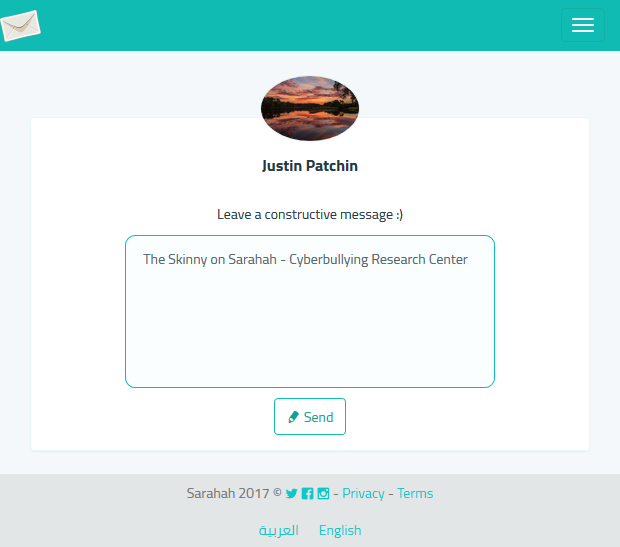Read the latest news and brand new pieces on youth, social media, and emerging technologies! We focus on preventing harm and promoting positive online behaviors.

Be Careful Who You “Friend” Online: A Cautionary Tale
In our school assemblies, Sameer and I regularly talk with students about using social media safely and responsibly. One part of this discussion focuses on encouraging youth to only connect on private accounts with those they know and trust. In general, if a Facebook user, for example, has their privacy settings configured in a way […]

My Fulbright Award for Bullying and Cyberbullying Prevention
This past summer, I served as a Fulbright Specialist at the Anti-Bullying Centre (ABC) at Dublin City University (DCU) in Dublin, Ireland. It was an amazing experience. I just wanted to take a few minutes to share what it involved, who I spent time with, and how it made an impact – not just short-term, […]

The Skinny on Sarahah
Sarahah is the latest social media application to create a stir. Simply put, Sarahah is a one-way, many-to-one anonymous messaging system that allows people to send messages to a particular person without the recipient knowing who sent them. These can come from people you know (from those in your phone contacts, for example) or from […]

Harmful Speech Online: At the Intersection of Algorithms and Human Behavior
Last week, I attended a workshop at Harvard entitled “Harmful Speech Online: At the Intersection of Algorithms and Human Behavior.” Sponsored and organized by the Berkman Klein Center for Internet & Society, Institute for Strategic Dialogue, and Shorenstein Center for Media, Politics and Public Policy, its goal was to “broadly explore harmful speech […]

How Machine Learning Can Help Us Combat Online Abuse: A Primer
Ten years ago, computer scientists would contact our Center and ask if we could give them thousands of examples of cyberbullying content – which they wanted to comb through to look for trends and patterns in how harm was inflicted. Nowadays, they don’t ask for data because it’s widely available for them to web scrape […]

More on the Link between Bullying and Suicide
Last week I received an email from Martin Cocker, a friend and colleague who runs the Netsafe organization in New Zealand. Netsafe is a one-stop shop for all things related to online safety. If you are a New Zealander who is being mistreated online, or work with someone who is, Netsafe can help. Last year […]

Blue Whale Challenge
When you sign up for the “Blue Whale Challenge,” you are given a series of tasks over a period of 50 days. One day you could be told to watch a scary movie at 4:20am, while on another you might be required to cut yourself. On the 50th day though, to win the challenge, you […]

Reflections on the 2017 World Anti-Bullying Forum
The inaugural World Anti-Bullying Forum was held in Sweden this week (where the cherry blossoms were blooming!), and I had the honor of representing the Cyberbullying Research Center and the International Bullying Prevention Association (IBPA) in attending. I am doing some work at Dublin City University for the first half of this summer, and so […]

What to do About Teen Sexting
Over six years ago I wrote a post where I offered advice to teens who receive a sext. “Sexting” is when someone takes a naked or semi-naked (explicit) picture or video of themselves, usually using their phone, and sends it to someone else. We are mostly concerned with these behaviors as they occur among middle […]

How Parents Can Build Resilience With Activities, Movies, and Books
We have talked a lot about resilience over the last year, and have shared some practical ways to cultivate that ability. Today, I want to provide some additional tangible strategies to help you further. I have previously discussed that it is critical for kids to be placed intentionally in situations where they can discover their […]

